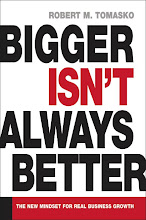December 10, 2008
A perfect storm - or lack of clear vision?
Washington Post’s Steve Pearlstein has written another of his classic on-target columns about what’s behind the recent sinking performance of so many companies. He takes strong issue with the “perfect storm” defense being used recently by so many business leaders.
As always, he’s very direct:
Pearlstein also notices that:
He then goes on to observe how widespread victimology-thinking has become in executive suites:
The rest of Steve’s article shows how these executives are totally off-base in their analyses of what went wrong.
Being a journalist, he saves his greatest wrath for Sam Zell, head of the now-bankrupt Tribune:
Pearlstein sees self-delusion and the herd mentality behind many of Wall Street’s and Detroit’s current woes. He sums things up saying:
Link
As always, he’s very direct:
“A bit of unsolicited advice to business executives trying to explain why their company or their industry is suddenly in the soup:
Please spare us the "perfect storm" metaphor.
It's hackneyed, for starters. It doesn't square with the facts. And for people who fancy themselves leaders, it's downright unbecoming.
The reason the perfect storm is such an appealing metaphor for these shipwrecked captains of industry is that it appears to let them off the hook. … It's an act of nature that nobody could have predicted -- or so the story goes.”
Pearlstein also notices that:
“…these guys actually buy into this nonsense.
The rest of us want desperately to believe that what brought us this economic crisis was some combination of greed, fraud and negligence -- and, no doubt, there was quite a bit of that. What the populist critique ignores, however, is that at the heart of any economic or financial mania is an epidemic of self-delusion that infects not only large numbers of unsophisticated investors but also many of the smartest, most experienced and sophisticated executives and bankers.
It's not that they don't see the excesses and dangers in front of them -- how could they not? But somehow they convince themselves that the world has changed, that the old rules no longer apply or that, because of competitive pressure, they had no choice but to run with the herd.”
He then goes on to observe how widespread victimology-thinking has become in executive suites:
“In recent months, I've had a chance to talk with half a dozen top business leaders whose companies have fallen into the soup and read published interviews with many more. And almost to a person, they say that they've been replaying the tape over and over in their minds and, even now, they still can't figure out what they might have done differently, given what they knew at the time and the various pressures they were under. Or put another way, they continue to think of themselves as victims of a perfect storm.”
The rest of Steve’s article shows how these executives are totally off-base in their analyses of what went wrong.
Being a journalist, he saves his greatest wrath for Sam Zell, head of the now-bankrupt Tribune:
“The only perfect storm to hit the Tribune was the one that resulted from the collision of Zell's ego, his arrogance and his utter ineptitude in running a media empire, along with a total disregard for the financial well-being of thousands of employees whose retirement assets he commandeered for a financing scheme that gave him control of the company while putting in very little of his own money.”
Pearlstein sees self-delusion and the herd mentality behind many of Wall Street’s and Detroit’s current woes. He sums things up saying:
“What capsized the economy was not a perfect storm but a widespread failure of business leadership -- a failure that is only compounded when executives refuse to take responsibility for their misjudgments and apologize.”
Link
